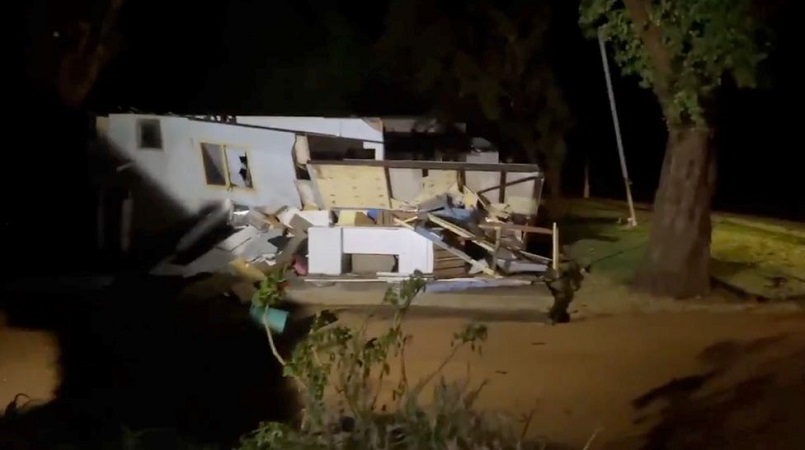
Tropical cyclone Seroja has ripped across a 1,000km (621 miles) stretch of Western Australia, leaving a trail of damage.
The category three storm made landfall near the town of Kalbarri on Sunday with gusts of up to 170km/h (105mph).
The storm was later downgraded to a tropical low, though strong winds continue to move south-east.
Residents reported smashed houses, fallen trees and downed power lines.
Kalbarri resident Debbie Major said the storm, which hit the resort town around 19:00 local time (11:00 GMT), raged through the night and was "absolutely terrifying".
"You just thought, this is it. I would have thought that when we opened the door, that there would be nothing around us except that roof," she told the Australian Broadcasting Corporation.
"We are a small town. Half of it has been flattened."
Weather authorities said Cyclone Seroja had sustained "uncommon" pace and strength overnight, as it moved from Kalbarri and Geraldton on the coast, and inland across the state's Wheat Belt.
The Bureau of Meteorology said while the storm had weakened, damaging gusts were still expected on Monday, with peak winds of 110km/h.
Several towns in the state's south-east remain under "red alert," meaning authorities advise residents to take shelter.
On Monday morning, emergency services agencies said it remained too early to assess the extent of the damage.
They had fielded 175 calls for help in the past 24 hours, a Department of Fire and Emergency Services spokeswoman told the BBC. Thousands of homes are said to be without power.
One Kalbarri resident told the West Australian newspaper that he was forced to hide in a pantry with his pregnant wife and their dog.
"I heard a few windows smash and some loud bangs. I went upstairs to check and felt that it was raining. I didn't look up but I am guessing I have lost some of my roof," Jason Regan said.
Darius Winterfield, a reporter for Channel 9 news in Kalbarri, lost the roof to his balcony and said the storm "will be devastating for many come first light".
Before the storm hit, state Premier Mark McGowan warned that the cyclone was "like nothing we have seen before in decades".
Residents in the affected area north of Perth had been urged to evacuate as the cyclone accelerated towards the shore.
Emergency services opened shelters ahead of the storm's arrival.
Last month, areas of eastern Australia were evacuated as rivers and dams overflowed in the worst floods in decades, with around 18,000 people displaced.
